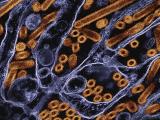Jul 15, 2008 (CIDRAP News) – In a recent medical journal article, Indonesian officials detailed the rationale for their refusal to share H5N1 influenza virus samples with the World Health Organization (WHO), asserting that it was in part a response to violations of the WHO's own guidelines by scientists and laboratories.
A key part of the Indonesian argument is that the WHO issued a statement in March 2005 that its reference labs should not distribute biological specimens to other organizations without permission from the country that supplied them. The report also maintains that withholding the viruses is not a violation of the International Health Regulations (IHR).
The report, authored by four Indonesian scientists and officials, including Health Minister Siti Fadilah Supari, was published in the June issue of Annals Academy of Medicine Singapore.
The article gives the Indonesian version of the sequence of events leading to the government's decision in January 2007 to stop sending H5N1 viruses to the WHO's reference labs. The essential reason was, and remains, the concern that samples provided freely by developing countries are used by companies in wealthy countries to develop vaccines and other products that the developing countries can't afford. Indonesia wants a guarantee that it will share in the benefits derived from the isolates it provides.
"If the world continues to operate in this way, the discrepancies will become wider and wider," the article says. "The poor will become poorer and the richer become richer. It is the responsibility of all nations to change this situation."
Because scientists need H5N1 isolates to track the virus's evolution, develop vaccines and diagnostics, and monitor drug resistance, Indonesia's action generated international concern. The move disrupted a 50-year-old tradition of free sharing of influenza viruses through the WHO.
WHO officials declined to comment specifically on the Indonesian report, noting that a series of international meetings to resolve the virus-sharing issue is continuing.
"In the meantime, individual countries like Indonesia are free to try and influence other countries," WHO spokeswoman Sari Setiogi told CIDRAP News by e-mail. "As secretariat, the WHO is more of a referee in this process but is fully supportive of an approach that is feasible, transparent and equitable and that will continue to provide protection and security for all countries."
The Indonesian report also includes a profile of the human H5N1 cases in Indonesia through the end of 2007, noting, among other things, that about a quarter of the 116 cases occurred in 10 clusters of blood relatives.
What led to a 'drastic decision'
Indonesia's first human H5N1 cases were identified in July 2005. From then until the end of 2006, the government sent all clinical specimens to two labs in the WHO's influenza surveillance network (the US Centers for Disease Control and Prevention [CDC] and Hong Kong University) for confirmation and risk assessment, the report says. In January 2007 the government made the "drastic decision" to withhold the specimens.
Incidents that offended Indonesia began in April 2006, the report says. Scientists at international meetings started reporting results of analyses of H5N1 viruses from Indonesia, without first getting permission from, or even notifying, Indonesia. In other cases, foreign scientists who studied Indonesian viruses sent to the WHO offered to include Indonesian experts and officials as coauthors, but only "at a very late stage of the manuscript writing," according to the journal article.
These "unethical practices" contravened the WHO guidance issued in March 2005 concerning the timely sharing of viruses with pandemic potential, the article says.
This guidance, according to the report, states, "The designated WHO Reference Laboratories will seek permission from the originating country/laboratory to coauthor and/or publish results obtained from the analyses of relevant viruses/samples." It also says, "There will be no further distribution of viruses/specimens outside the network of WHO Reference Laboratories without permission from the originating country/laboratory."
The source listed for the guidance is an online document that was accessed in March 2007 but, as the footnote says, is no longer available online. (The url listed for the document elicits only the message "This page is not available in English.")
Another episode that played a role was the emergence in May 2006 of Indonesia's largest H5N1 case cluster—one probable and seven confirmed cases, all in blood relatives, seven of them fatal. The cluster raised fears that a pandemic was beginning. One result was that Indonesia was criticized for releasing genetic data only to a small network of researchers linked to the WHO and the CDC, the Indonesian authors wrote.
In response to this "unfair" criticism, Indonesia decided that all its H5N1 virus sequence data at the CDC and Hong Kong University should be deposited in GenBank, a public database. But at the same time, the government decided to let its own labs confirm human H5N1 cases and not send samples to WHO labs for case confirmation anymore. However, officials elected to continue sending samples to the CDC for risk assessment and generation of seed viruses for vaccine production, the report explains.
Australian company's plan was pivotal
Then in late 2006 a journalist confirmed to Indonesian officials that an Australian company planned to develop an H5N1 vaccine from a virus that Indonesia had provided to the WHO network. This plan, the article says, "was not only in violation (again) of the WHO guidance for virus sharing (March 2005) but also . . . revealed the unfairness and inequities of the global system."
The Indonesian authors maintain that their policy is not a violation of the International Health Regulations (IHR) as revised in 2005. The regulations do not "literally or specifically" require countries to share biological samples related to potential public health emergencies, they argue. In their view, the IHR can be interpreted as requiring only the sharing of public health information, not biological materials.
Their interpretation also holds that countries have "sovereign control" over their biological resources, in keeping with the Convention on Biological Diversity, an international treaty adopted in 1992. "Hence, countries have the right and authority to decide whether to share their specimens with the WHO system or not, depending on their own judgment," the report says.
The report also traces the series of meetings convened by the WHO to try to resolve the virus-sharing issue. At a major meeting in November 2007, participants failed to reach a solution. But according to the Indonesian authors, the meeting brought an acknowledgement of a "breakdown of trust" in the global flu surveillance system and thereby "laid the foundation for a fundamental and significant change to the existing system."
Sedyaningsih ER, Isfandari S, Soendoro T, et al. Towards mutual trust, transparency and equity in virus sharing mechanism: the avian influenza case of Indonesia. Ann Acad Med Singapore 2008 Jun;37(6) [Full text]
See also:
Nov 26, 2007, CIDRAP News story "Virus-sharing pact eludes WHO group, but work will continue"
Jun 19, 2007, CIDRAP News story "Virus ownership claims could disrupt flu vaccine system"
Feb 6, 2007, CIDRAP News story "System for global pandemic vaccine development challenged"


















